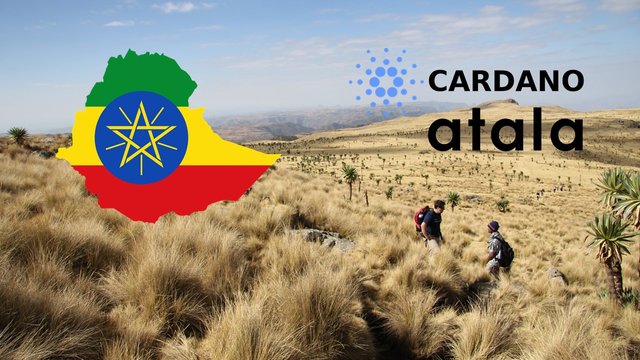The Atala project is a private enterprise blockchain framework to compete with private blockchain projects such as Hyperledger or Corda, which mainly uses the corporate world. But Atala will provide financial services to people in developing countries such as Ethiopia, Georgia or Mongolia.

Private blockchains
First of all, let's look at the difference between private blockchains like Hyperledger and public blockchains like Bitcoin or Cardano.
Private blockchains do not publish all the transactions publicaly like they are stored on Bitcoin blockchain. Private blockchains make sense and bring certain benefits, especially in business. In terms of security, the distributed data is of a different quality than the centralized synchronized database, especially if the counterparties do not trust 100%. Therefore, private blockchains can be used in business.
Cardano and Atala
Charles Hoskinson, CEO of IOHK, company which is developing Cardano, was one of the first people to do Bitcoin courses for people and has been around the world for some time. He is also co-founder of Ethereum. On his journeys, he asks politicians, businessmen and ordinary citizens how new technologies can help them. Thanks to this he has a very good overview of the rate of adoption of the crypt and how to increase it.
Cardano wants to increase adoption thanks to the Atala project. Atala is supposed to solve concrete real problems of people and then allow them to naturally connect with the public blockchain of Cardano and improve access and relationship to cryptocurrencies in general.
Atala - goals and mission
The mission of Atala is a bit different from that of private blockchains such as Hyperledger. Atala primarily wants to solve a problem for people and at the same time indirectly allow them to use cryptocurrencies. But blockchain is not a database, so there is no need for every single piece of information to be written in a publicly distributed blockchain.
Atala's goal is to connect private and public networks, connect an existing business or even entire states to a public blockchain. Publicly it makes sense to watch only what is of interest to the whole public, so Atala does not even have to be a blockchain and also will not have smart contracts.
In fact, IOHK has developed technology and has partnered with Ethiopia to use Atala for 6 million people in capital Addis Abeba. If this implementation will be successful, it can be used for all 105 milion people in Ethiopia. Other countries where Atala will be applied are Georgia and Mongolia.
A new national electronic currency will be created in Ethiopia in the form of tokens on the Atala framework. Identification cards will also be included. Thanks to the new electronic payment system, it will be easier to pay for electricity or in conjunction with electronic identification cards, to purchase alcohol or other things for which they need to reach a certain age, but completely anonymously.
Another problem that Atala in Ethiopia will solve is supply chain management. Farmers in Ethiopia have particular problems, such as high levels of corruption, high fees for intermediaries and the inability to connect with end-users of their products. Even these problems will be solved by their new network on the Atala framework. Thanks to its modularity, this will not be a problem for Atala.
Conclusion
Atala will help the growth and adoption of Cardano and cryptocurrencies in general. By first helping to solve specific problems of individuals in developing countries such as Ethiopia, Mongolia and Georgia. Those three countries have over 110 million people in total. In addition, projects deployed on Atala will be interoperable with Cardano.
We already have functioning infrastructure and information systems in western countries, so the adoption of such projects is not so necessary and governments do not need to deploy it.
It is the deployment of Atala that may be the first significant driver in the adoption of cryptocurrencies. Moreover, other countries may follow. IOHK focused primarily on the African states, but the deployment of Atala is possible everywhere in the world. Where it is needed.
Hi @blockchainfo.
It is an interesting project, now we must wait for its application to verify how successful it can be. For what it represents, hopefully it can fulfill its purpose and then expand to other countries, and if it can help adoption it is wonderful.
Downvoting a post can decrease pending rewards and make it less visible. Common reasons:
Submit
Congratulations @blockchainfo! You have completed the following achievement on the Steem blockchain and have been rewarded with new badge(s) :
You can view your badges on your Steem Board and compare to others on the Steem Ranking
If you no longer want to receive notifications, reply to this comment with the word
STOPVote for @Steemitboard as a witness to get one more award and increased upvotes!
Downvoting a post can decrease pending rewards and make it less visible. Common reasons:
Submit
Hi @blockchainfo
Resteemed already. Upvote on the way :)
Thanks for supporting our efforts and setting up ph-fund as beneficiary.
Downvoting a post can decrease pending rewards and make it less visible. Common reasons:
Submit
This idea seems promising and I want it to work well, I like to see it implemented in the near future, both for the interconnectivity between the Bolckchains and for controlling corruption and favoring the transparency of the processes in favor of people.
Downvoting a post can decrease pending rewards and make it less visible. Common reasons:
Submit